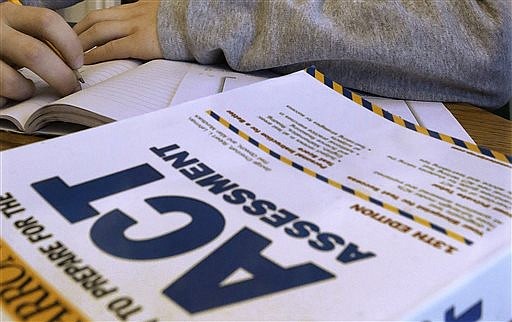Arkansas public schools will resume giving the ACT Aspire tests to third-through-10th grade students next spring.
The Aspire testing will be done on school campuses -- not remotely -- during a five-week window, April 5 to May 7.
The state had a waiver of federal testing requirements this past spring in response to the coronavirus pandemic.
Deborah Coffman, the state's assistant commissioner for school accountability, and other state Division of Elementary and Secondary Education staff members told the Arkansas Accountability System Steering Committee on Wednesday that the state doesn't have the authority to forgo the testing program a second year.
The student testing is a requirement of the federal Every Student Succeeds Act. More than $371 million in annual federal funding for various education programs in Arkansas hinges on the state's compliance to that law, Coffman told the education stakeholder committee chaired by state Board of Education member Ouida Newton of Leola.
Committee members did not object to the resumption of the testing program. But they had concerns about how to convey the importance of the Aspire test to public school families who may be reluctant to send their online student learners to a school building -- where they could be exposed to the virus -- for the exams.
Van Buren Superintendent Harold Jeffcoat, a member of the steering committee, said it will be a challenge to get the required 95% of online student learners into schools for the Aspire tests in math, literacy and science. The scheduling flexibility provided by the extended testing window will help, he said.
"I think it is important to get back to testing, to get back to the point where we can measure our overall academic achievement of our students in our districts," Jeffcoat told his fellow committee members and state agency staff.
"It allows us as a district to compare programs," he added about virtual and in-school academic programs. "This is a great opportunity to look at the data and determine the level of effectiveness and any modifications or changes we need to make."
Jeffcoat predicted that the upcoming exams will show that the pandemic has had a negative effect on student achievement -- that his district is seeing students struggle because of the pandemic who would not have otherwise.
"We're all in the same boat ," he said about schools and districts.
The U.S. Department of Education earlier this year granted Arkansas a waiver to skip the administration of the Aspire test and the calculation of school accountability scores for the 2019-20 school year. That came after Gov. Asa Hutchinson -- and governors across the country -- last March ordered schools to be closed to on-campus instruction in an attempt to limit the spread of the coronavirus that causes the potentially fatal covid-19 illness.
Arkansas public school campuses did not fully re-open until the week of Aug. 24 with significant numbers of students and their families opting for virtual instruction -- away from their school buildings.
Rachel Horn, the education division's program manager for student assessment, said that although there are no remote options for the spring testing, school districts have already had some experience with working with online learners and tests other than the Aspire this school year.
"We have seen a lot of creative approaches to the logistics of assessment and so I think the districts will use what they are learning in the fall and winter to have a successful administration in the spring," Horn said.
She urged that districts and schools schedule the Aspire tests for time early in the testing window so that if a school has to pivot to online learning at the time the tests are supposed to be given, the tests can be rescheduled for later in the testing window.
Denise Airola, the director of the University of Arkansas, Fayetteville's Office of Innovation for Education, encouraged schools and the families of online students to build relationships and lines of communication so that the families feel that their concerns about on-site testing can be addressed and accommodations made to ease the family's fears. She raised the possibility of surveying parents about their testing concerns.
Tammie Reitenger, coordinator of school performance for the state, said her work with a state committee on school accountability, shows that educators want to test students to be able to identify student academic needs and how they have "come through covid" and what needs to be done to move forward.
One of the concerns is that of the state application of A to F letter grades by the state to the schools and how that could be "misused" in the community.
Reitenger also said some districts are struggling with how to ensure that at least 95% of their students take the Aspire test as required by provisions in the federal law.
Airola presented calculations showing that meeting the 95% requirement is achievable on a statewide basis, although she said some districts will struggle more than others to reach the threshold.
Committee member Imaobong Etim suggested posting videos of testing scenarios as a way to ease parent concerns.
Committee member Melissa Bratton of Hot Springs said her school district has had high participation in other testing programs this year.
Coffman and others Wednesday described how the pandemic, testing waivers and virtual instruction have affected teacher evaluations and identification and instruction for students who don't speak English.
Coffman also raised the possibility during the Wednesday steering committee meeting of asking the U.S. Department of Education for modifications to the state's Every Student Succeeds Act school accountability plan. But ultimately the steering committee recommended that Arkansas seek federal government approval to omit or skip over 2019-20 when doing accountability score calculations on year-to-year academic growth.
